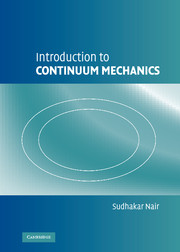Book contents
- Frontmatter
- Contents
- Preface
- Introduction to Continuum Mechanics
- 1 Introduction
- 2 Cartesian Tensors
- 3 General Tensors
- 4 Integral Theorems
- 5 Deformation
- 6 Motion
- 7 Fundamental Laws of Mechanics
- 8 Stress Tensor
- 9 Energy and Entropy Constraints
- 10 Constitutive Relations
- 11 Hyperelastic Materials
- 12 Fluid Dynamics
- 13 Viscoelasticity
- 14 Plasticity
- Author Index
- Subject Index
14 - Plasticity
Published online by Cambridge University Press: 05 June 2012
- Frontmatter
- Contents
- Preface
- Introduction to Continuum Mechanics
- 1 Introduction
- 2 Cartesian Tensors
- 3 General Tensors
- 4 Integral Theorems
- 5 Deformation
- 6 Motion
- 7 Fundamental Laws of Mechanics
- 8 Stress Tensor
- 9 Energy and Entropy Constraints
- 10 Constitutive Relations
- 11 Hyperelastic Materials
- 12 Fluid Dynamics
- 13 Viscoelasticity
- 14 Plasticity
- Author Index
- Subject Index
Summary
The time-independent, permanent deformation in metals beyond the elastic limit is described by the term plasticity. As shown in Fig. 14.1, the elastic part of the uniaxial stress–strain curve OA is reversible. When we unload from any point beyond point A, corresponding to the zero-stress state, there is a permanent deformation in the specimen. Several theories describing the plastic behavior of metals have been proposed, but none is totally satisfactory. Ideally, the stress σ, separating the elastic part OA from the inelastic part, is called the yield stress σ0 of the material. However, it is difficult to obtain this special point accurately from experiments, and it often depends on the history of the loading the specimen has undergone.
When a specimen is unloaded from a point C to zero stress and reloaded, permanent deformation usually begins at a stress level σC. In other words, the yield stress is higher after the specimen has undergone a certain amount of permanent deformation. This is known as work hardening or strain hardening.
Another feature of metal deformation is that, from a strained state, beyond the yield point, reversal of loading causes the compressive yield stress to be different from the tensile yield stress. It is usually lower in magnitude than the tensile yield stress. This effect is called the Bauschinger effect.
Information
- Type
- Chapter
- Information
- Introduction to Continuum Mechanics , pp. 200 - 228Publisher: Cambridge University PressPrint publication year: 2009
